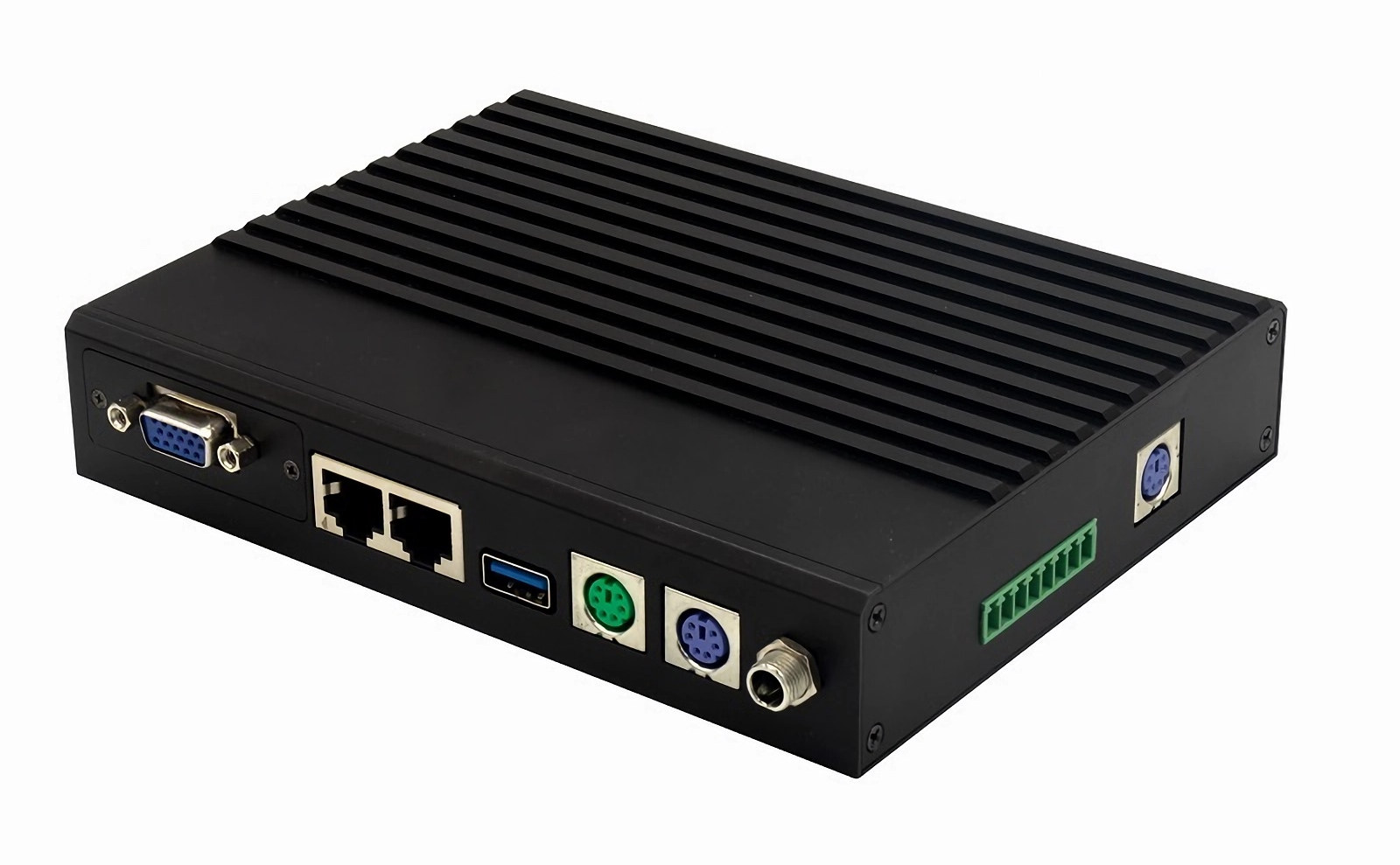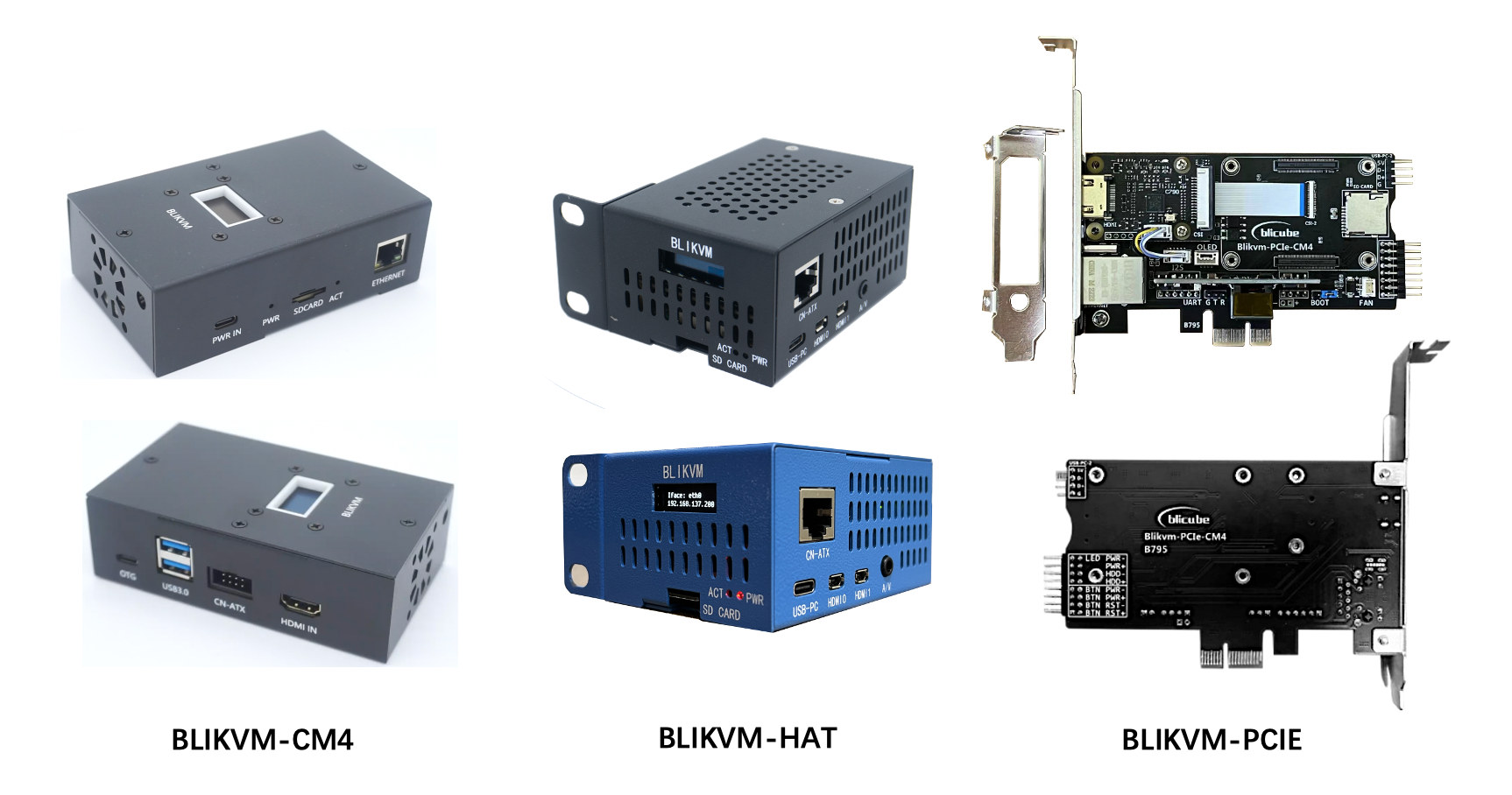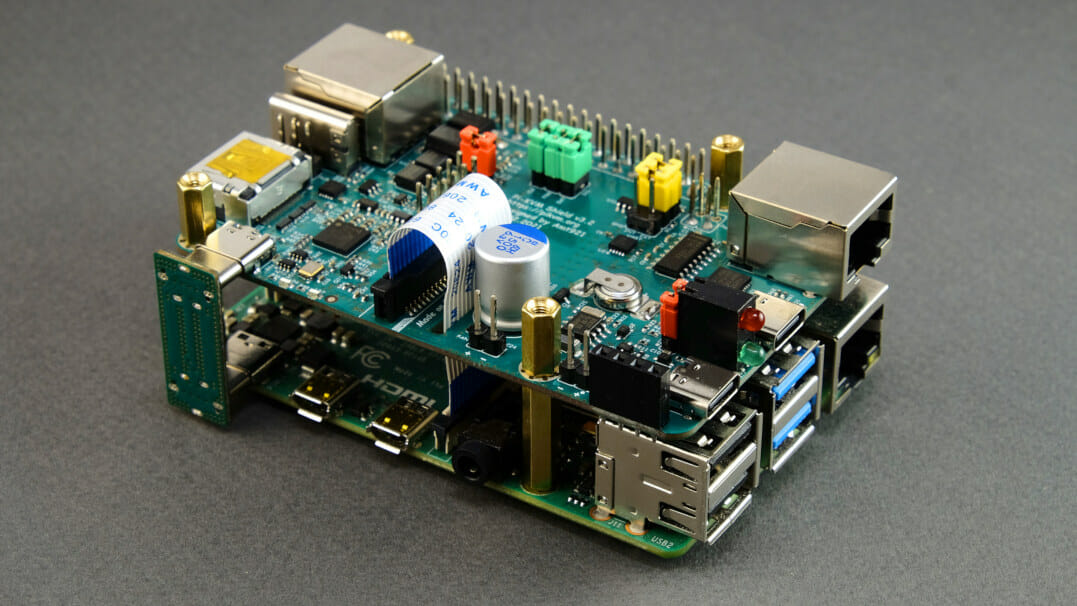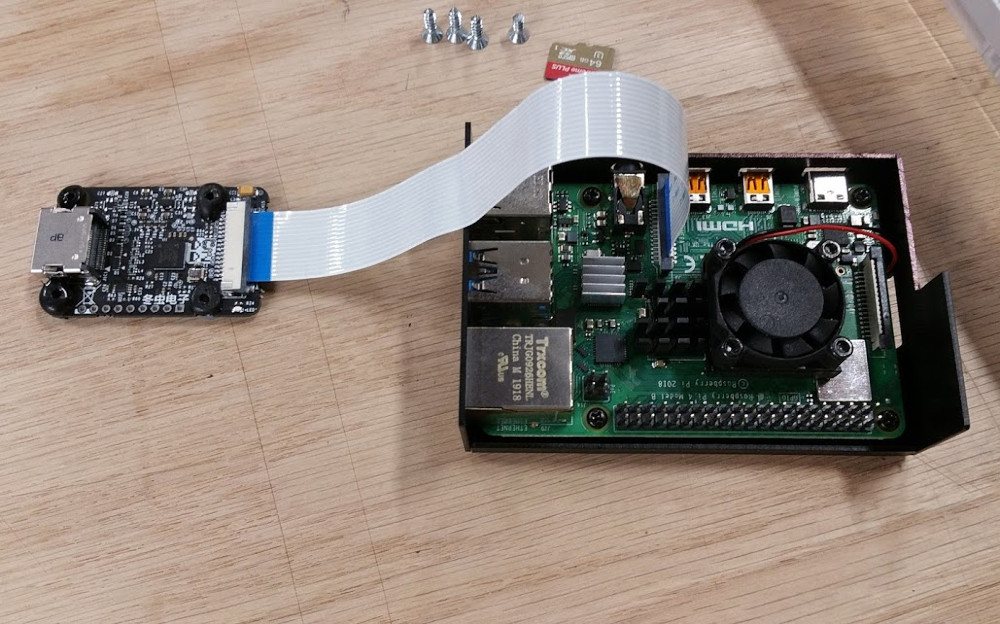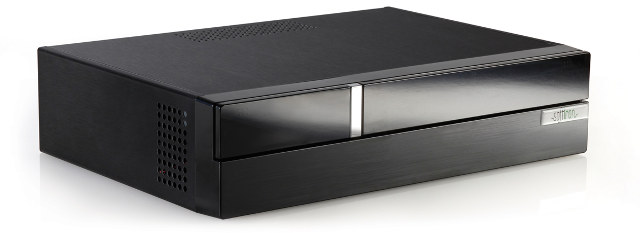Banana Pi has started working on the BPI-KVM box based on a Rockchip RK3568 SoC, but it’s not a mini PC, and instead, it is a KVM over IP solution designed to remotely control another computer or device as if you were on-site with, for example, the ability to turn on and off the connected device, access the BIOS, and so on. Commercial KVM over IP solutions used to be expensive, but people have started to use Raspberry Pi SBCs with an expansion board such as the PiKVM v3, and more recently Raspberry Pi CM4-based KVM over IP solutions have been launched for under well $200. Seeing the popularity of these solutions, Banana Pi has decided to join the fray with its own BPI-KVM powered by an IO-rich Rockchip RK3568 processor that provides all interfaces needed for this type of application. Banana Pi BPI-KVM (preliminary) specifications: SoC – Rockchip RK3568 […]
BLIKVM open-source KVM over IP works with Raspberry Pi CM4, Raspberry Pi HAT, PCIe card, and soon Allwinner H616
BLIKVM is an open-source KVM over IP software that helps you manage servers or workstations remotely regardless of the health of the target system, and currently working with Raspberry Pi CM4 hardware, a Raspberry Pi HAT, or a PCIe board, and a new model based on MangoPi’s Allwinner H616 CPU module is coming soon. We’ve previously written about the Raspberry Pi-based PiKVM DIY project, followed by the PiKVM v3 Raspberry Pi HAT from the same project, and now I can see there’s a CM4-based PiKVM V4 that was on Kickstarter last month and raised over $800,000… You’d think this kind of system would be rather a niche market, but there’s even demand to have a similar open-source project called BLIKVM offering many of the same features since it’s based on PiKVM, except for the option to use a PCIE card fitted with a CM4 module. Highlights of the BLIKVM project: […]
Android 13 virtualization lets Pixel 6 run Windows 11, Linux distributions
The first Android 13 developer preview may have felt a bit underwhelming, but there’s a hidden gem with full virtualization possible on hardware such as the Google Pixel 6 smartphone. What that means is that it is now possible to run virtually any operating system including Windows 11, Linux distributions such as Ubuntu or Arch Linux Arm on the Google Tensor-powered phone, and do so at near-native speed. Android & web developer “kdrag0n” tested several Linux distributions compiled for Aarch64 on the Pixel 6 with Ubuntu 21.10, Arch Linux Arm, Void Linux, and Alpine Linux using “the KVM hypervisor on Pixel 6 + Android 13 DP1”. He/she further explains: As far as I can tell, we can pretty much get full EL2 on production devices now. Protected KVM is optional and can be enabled on a per-VM basis, but for non-protected VMs, it looks like full KVM functionality is available. […]
PiKVM v3 Raspberry Pi HAT offers KVM over IP on the cheap (Crowdfunding)
Last December, we wrote about the inexpensive DIY Pi-KVM board to add KVM over IP to the Raspberry Pi board mentioning PiKVM v3 was in the works with extra features such as onboard ATX power control. It turns out PiKVM v3 HAT has been on Kickstarter for about a month and raised close to $600,000 US from over 2,500 backers with just about two days to go at the time of writing. PiKVM v3 hardware features and specifications: Video & audio capture port – 1x HDMI input up to 1080p50 MIPI CSI-2 interface to Pi to visualize HDMI input USB 1x USB-C console port 1x USB-C power input port USB-OTG pins USB-C OTG port doing the emulation of a USB keyboard, mouse, Virtual CD-ROM or USB Flash Drive, USB-Ethernet, USB-Serial port, etc… Console – RJ45 console port Debugging – UART access pins Expansion SPI and an extra GPIO for the […]
DIY Pi KVM: An easy and cheap KVM over IP for Raspberry Pi
Traditional IP-KVM systems may cost you hundreds of dollars. DIY Pi KVM over IP is a very simple and fully functional Raspberry Pi-based KVM over IP that you can make yourself. If you do not know what IP-KVM is, it stands for keyboard, video, and mouse. It allows you to connect to a computer or a server remotely. With this, you can fix problems such as configuring the BIOS or reinstalling the OS using a virtual CD-ROM or flash drive. You can see the v2 example implementation in the above image. Pi-KVM v0 and v2 are ready-made images available for download for Raspberry Pi. You will find all the required hardware in the “Getting Started” section for the v0 and v2 platform for Raspberry Pi. In the figure below you can see the B101 HDMI-to-CSI bridge connected to the Raspberry Pi. The team is working to launch the v3 board […]
$599 Softiron Overdrive 1000 Server is Powered by AMD Opteron A1100 64-bit ARM Processor
ARMv8 servers have been around for a year or so, but normally only available to companies, mostly due to their very high price. LeMaker Cello board based on AMD Opteron A1120 quad core SoC have changed that since it’s priced at $299, but I’m not sure it’s shipping right now, and it’s not a complete solution fitted with memory and storage, and lacks an enclosure. The good news is that Softiron has just launched Overdrive 1000 server powered by AMD Opteron A1100 series processor, with 8GB DDR4 RAM, a 1TB drive, and a case. Softiron Overdrive 1000 server specifications: SoC – AMD Opteron A1100 series quad core ARM Cortex A57 processor System Memory – 2x RDIMM slots fitted with 8GB DDR4 DRAM and expandable to 64GB Storage – 2x SATA 3.0 connector with one fitted with a 1TB HDD Connectivity – 1x GBase-T Ethernet USB – 2x USB 3.0 ports […]
Linux 4.0 Release – Main Changes, ARM and MIPS Architectures
Linus Torvalds “Ima Sheep” released Linux Kernel 4.0 on Sunday: So I decided to release 4.0 as per the normal schedule, because there really weren’t any known issues, and while I’ll be traveling during the end of the upcoming week due to a college visit, I’m hoping that won’t affect the merge window very much. We’ll see. Linux 4.0 was a pretty small release both in linux-next and in final size, although obviously “small” is all relative. It’s still over 10k non-merge commits. But we’ve definitely had bigger releases (and judging by linux-next v4.1 is going to be one of the bigger ones). Which is all good. It definitely matches the “v4.0 is supposed to be a_stable_ release”, and very much not about new experimental features etc. I’m personally so much happier with time-based releases than the bad old days when we had feature-based releases. That said, there’s a few […]
Linaro 14.10 Release with Kernel 3.17 and Android 4.4.4, Debian ARM64 Port Almost Complete
Linaro 14.10 has just been released with Linux kernel 3.17 (baseline), Linux 3.10.54 & 3.14.19 (LSK, same versions as last month), and Android 4.4.2 & 4.4.4. Most of the work is a continuation of previous months working member hardware, and ARM64, but one particularly interesting point is that 90% of Debian packages have been built for ARM64, and the next version of Debian should have an official ARM64 port. Here are the highlights of this release: Linux Linaro 3.17-2014.10 updated linaro-android topic. In particular, CONFIG_IPV6=y is no longer the requirement for linux-linaro tree builds GATOR version 5.19 (same version as in 2014.08 release). gatord is fixed to build for ARMv8. dropped multi_pmu_v2 topic by ARM LT (no longer used) updated topic from Qualcomm LT (include IFC6410 board support) replaced integration-linaro-vexpress topic by integration-linaro-vexpress64. Starting from 2014.10 release, linux-linaro kernel tree will use the mainline support for 32-bit vexpress boards. integration-linaro-vexpress64 […]


